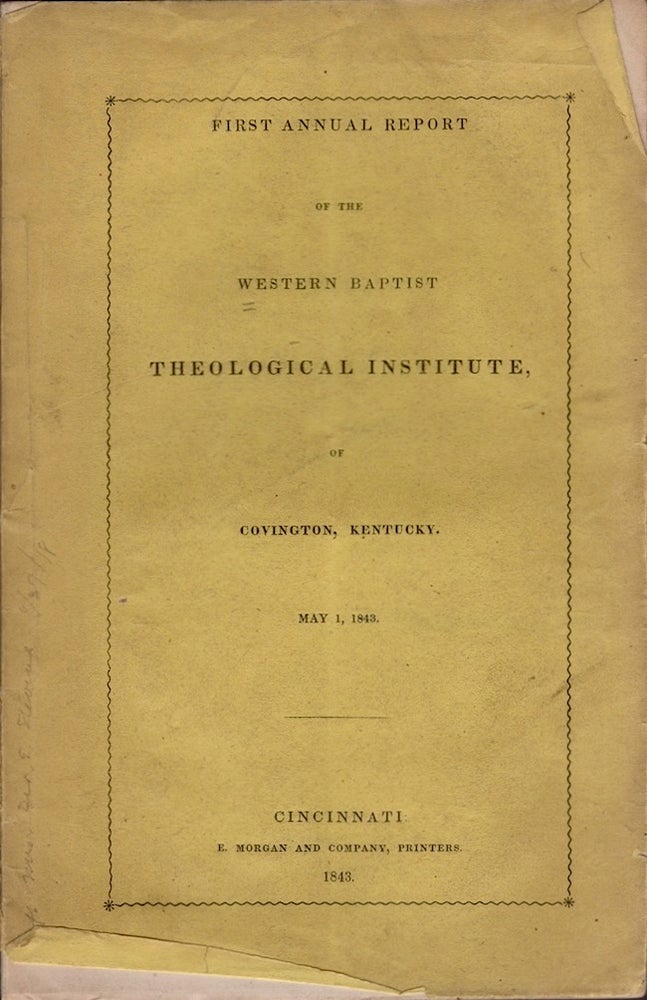
First Annual Report of the Western Theological Institute of Covington, Kentucky. May 1, 1843
Cincinnati: E. Morgan and Company, Printers, 1843.
First Edition. Wraps. Wraps. 22 pages. Yellow covers with printed title on the front wrap. Ex-institutional copy from the Western Reserve Historical Society with an embossed stamp on the title page. "Withdrawn" written in black over the stamp. Light soiling to the covers. Some margin marks in the text. A good copy. Scarce. 3 copies located in OCLC. Good. Item #18648
Despite an excellent start, the Western Baptist Theological Institute proved very fragile. The institute was established to serve western Baptist, both those from the north and the south. The issue of slavery, however, divided the western Baptists from the very founding. Reverend Patterson, the institute’s president, also served on the National Board of Foreign Missions. This board published a number of articles indicating that slavery should not be tolerated in the Baptist faith. This association between Patterson and abolitionism caused much concern among the institutes southern trustees and students. On May 8, 1845, Baptists delegates from the southern states met in Augusta, Georgia and formally established the Southern Baptist Convention. This split would have grave consequences for the Western Baptist Theological Institute.
Several southern members of the board of trustees asked Dr. Patterson to publicly state his opinions on abolitionism. He refused to do so. Instead, Patterson left Covington and was replaced by Dr. S.W. Lynd. In 1848, a southern member of the board introduced a resolution that spoke of slavery as divinely inspired. The resolution was defeated. The four southern board members who voted for the resolution were undaunted. These members, without consent of the rest of the board, lobbied for the passage of a bill at the Kentucky General Assembly in Frankfort. The bill called for the appointment of 16 new members to the Board of the Western Baptist Theological Institute. In addition, all future trustees were required to be Kentucky citizens. The bill became law.
The northern members of the board were stunned by this obvious attempt to take control of the institute. They were particularly angry, because most of the funds that had donated to the institute were donated by northerners and because most of the students were from the north. The northern members of the board fought to strike down the new law. Eventually, the Kenton Court of Appeals declared the law null and void.
The abolitionist controversy and the split between factions on the board took its toll on the institute. Donations plummeted along with the student enrollment. In 1855, the board decided to close the Western Baptist Theological Institute. Both factions agreed to a sale of all the property, with the proceeds being divided equally.
In August 1855, the Main building of the institute was sold to W. Scott. Mr. Scott operated a small female college and preparatory school in the building for several years. During the Civil War, the hospital was utilized as a convalescent hospital for wounded Union soldiers. In 1867, the building was purchased by the Sisters of the Poor of St. Francis. The sisters relocated their St. Elizabeth Hospital to the site. St. Elizabeth Hospital occupied the building until 1914 when the current hospital was completed. In 1916, the main building of the Western Baptist Theological Institute was razed and Wadsworth Electric Company was built on the site.
Ware, Orie S., “Western Baptist Theological Institute,” In the Papers of the Christopher Gist Historical Society, Vol. I, p. 43-49; James, W.C., “A History of the Western Baptist Theological Institute,” In the Collection of the KCPL; Licking Valley Register, May 25, 1842, p. 3, June 4, 1842, p. 3, May 31, 1845, August 23, 1845, p. 1; Covington Journal, August 24, 1849, p. 3, November 22, 1851, p. 2, August 12, 1854, p. 2; Kentucky Post, November 24, 1916, p. 1.
Price: $125.00


